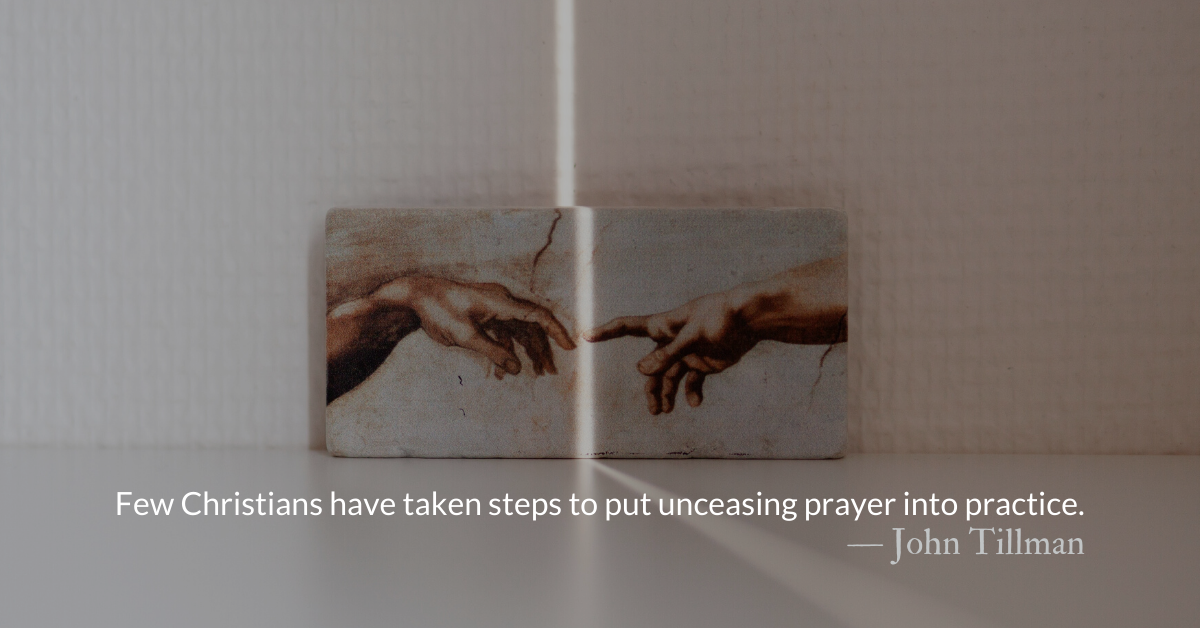Scripture Focus: Proverbs 18.14
The human spirit can endure in sickness,
but a crushed spirit who can bear?
Reflection: Breathing Prayers
By John Tillman
The social, financial, and mental health costs of this sickness are pushing our culture to the end of the ability of the “human spirit” to endure. We are worn out with anxiety. We are weighed down by ballooning financial burdens. We have lost jobs and profits and we are fearful of losing family, friends, and acquaintances.
How can we possibly endure? What can keep our spirits from being crushed? One source of unending strength and endurance may come through what Richard Foster calls, “Unceasing Prayer.”
Most of us know the famous Pauline verse, “Pray without ceasing.” (1 Thessalonians 5.17). It is merely the shortest of the many New Testament directives to pray unceasingly. (Romans 12.12; Ephesians 6.18; Colossians 4.2; Philippians 4.6; Hebrews 13.15; Luke 18.1)
Few Christians, however, have taken steps to put unceasing prayer into practice.
One of the simplest methods for doing this—and therefore a good place to start—is called “breath prayers.” This practice is outlined in detail in Foster’s book, Prayer: Finding the Heart’s True Home.
Breath prayers are simply short prayers which can be said “in a breath.” These are often taken from scripture. One famous breath prayer is adapted from Luke 18.13, “God be merciful to me, a sinner.” It is called the Jesus Prayer: “Lord Jesus Christ, Son of God, have mercy on me, a sinner.”
You can find your own breath prayers from throughout the scripture. Any scripture that God brings to your mind is useful as a breath prayer. A deep familiarity with scripture (made possible by regular and repetitive reading) will make this a more common occurrence in one’s life.
It is perhaps a little too long to be called a breath prayer, but one scripture-based prayer that my wife and I pray regularly is based on Galatians 5:22-23. “Come Holy Spirit, we pray that your fruit would be in us: love, joy, peace, patience, kindness, goodness, faithfulness, gentleness, and self-control.”
Out of your relationship with God, you can also write your own breath prayers. They can come from complaints, from questions about the Bible, from sermons, from requests, or just a simple acknowledgment of need. Some examples of these may be, “God give me grace.” “God help me forgive.” “Christ, speak through me.”
Repeating these prayers throughout one’s day keeps one’s mind connected to Christ, keeps one’s steps closer to his will, and readys one’s heart for the next discipline.
Divine Hours Prayer: The Refrain for the Morning Lessons
Purge me from my sin, and I shall be pure; wash me, and I shall be clean indeed. — Psalm 51.8
– Divine Hours prayers from The Divine Hours: Prayers for Springtime by Phyllis Tickle.
Today’s Readings
Proverbs 18 (Listen 2:23)
Colossians 1 (Listen -4:18)
Read more about Praying as Priests
As followers of God today, a part of our identity is as carriers of the blessings of God that are intended for the world.
Read more about Praying Through Betrayal and Failure
May we respond to boasts with humility, to deceit with the truth, to evil with good, and to harm with healing words of comfort and love.







